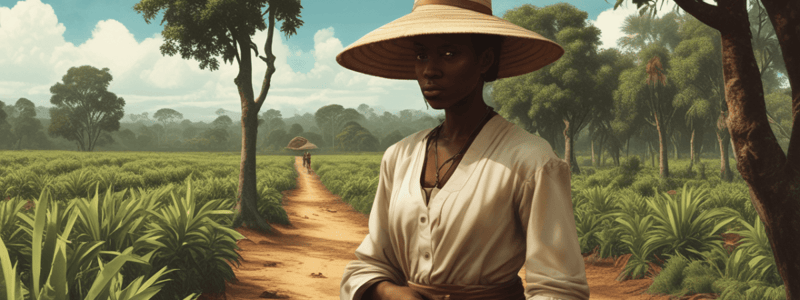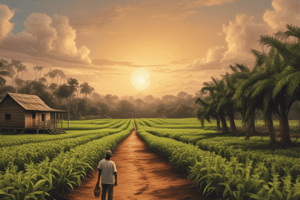Podcast
Questions and Answers
The economic, physical and social control exerted over ______ Africans on sugar plantations.
The economic, physical and social control exerted over ______ Africans on sugar plantations.
enslaved
It was illegal for an ______ to own property without his master's consent.
It was illegal for an ______ to own property without his master's consent.
enslaved
Planters enacted laws that prevented Africans from planting ______ crops of cotton or sugar cane.
Planters enacted laws that prevented Africans from planting ______ crops of cotton or sugar cane.
staple
Physical measures included placing the ______ persons in stocks.
Physical measures included placing the ______ persons in stocks.
Laws restricted the movement of ______ people on the islands.
Laws restricted the movement of ______ people on the islands.
Curfew were enacted to manage the movement and assembling of persons from planning events or ______.
Curfew were enacted to manage the movement and assembling of persons from planning events or ______.
Planters were allowed to sell their property and separate a ______ at any time prior to 1823.
Planters were allowed to sell their property and separate a ______ at any time prior to 1823.
The enslaved Africans were forced to celebrate and practice ______ holidays.
The enslaved Africans were forced to celebrate and practice ______ holidays.
Blowing horns or beating drums were forbidden as these were forms that Africans were able to ______ with each other.
Blowing horns or beating drums were forbidden as these were forms that Africans were able to ______ with each other.
Africans were forced to accept ______ religious practices and beliefs.
Africans were forced to accept ______ religious practices and beliefs.
Reading or learning to read was a ______ crime.
Reading or learning to read was a ______ crime.
The enslaved themselves often suffered severe ______ for the crime of literacy.
The enslaved themselves often suffered severe ______ for the crime of literacy.
Flashcards are hidden until you start studying
Study Notes
Economic Control
- Enslaved Africans were economically controlled, making them dependent on planters and less likely to attempt escape.
- Illegal for enslaved people to own property without their master's consent.
- Provision ground size was limited to prevent substantial profits or self-sufficiency.
Physical Control
- Physical measures included:
- Stocks (wooden frames to restrict movement)
- Severe beatings
- Amputation of limbs
- Killing
- Laws restricted movement, prohibiting enslaved people from leaving the plantation without permission.
- Curfews were enacted to manage movement and assembly.
- Relationships between enslaved people from different plantations were forbidden.
Social Control: Cultural Measures
- Enslaved Africans were forced to celebrate and practice Western holidays.
- African cultural practices, such as blowing horns or beating drums, were forbidden.
- African Spiritualism and Islam were prohibited.
- Enslaved people were forced to adopt European religious practices and beliefs.
Social Control: Education
- Education was prohibited for enslaved Africans.
- Reading or learning to read was a punishable crime.
- Anyone caught teaching an enslaved person to read would be severely whipped.
- Enslaved people who learned to read suffered severe punishments, including savage beatings and amputation of fingers and toes.
Studying That Suits You
Use AI to generate personalized quizzes and flashcards to suit your learning preferences.




